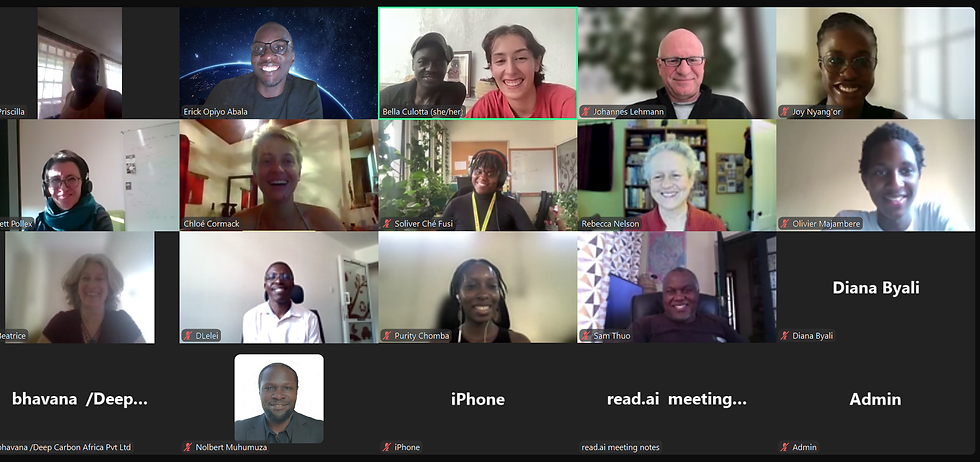Revolutionizing Waste Management: How the RUNRES Project is Shaping the Circular Economy
- Apr 9, 2025
- 3 min read

CBEN monthly calls had Sharon Mireri, a postdoctoral scientist involved in the RUNRES Project, offer an enlightening overview of the project’s progress and its innovative contributions to the circular economy. The RUNRES Project, which stands for Rural-Urban Nexus: Establishing a Nutrient Loop to Improve City Region Food System Resilience, is a groundbreaking initiative implemented in four countries—Ethiopia, the Democratic Republic of Congo (DRC), Rwanda, and South Africa. Coordinated by ETH Zurich and funded by the Swiss Agency for Development Cooperation (SDC), the project is driven by a central mission: to close the nutrient loop and improve the resilience of food systems across city-regions.
The project spans eight years and is divided into two key phases. During the initial four years, RUNRES focused on piloting a range of innovations and technologies aimed at resource recovery and sustainable agriculture. In the current phase, the focus has shifted toward scaling up the most effective interventions. At its core, the project seeks to return nutrients back to the soil, reinforcing a sustainable cycle that benefits both urban and rural populations.
Each participating country has adopted context-specific strategies to tackle unique waste and agricultural challenges. In the DRC, the primary issue revolved around the management of waste from urban markets. To address this, RUNRES co-financed the establishment of a composting facility aimed at benefiting coffee farmers, with entrepreneurs contributing 50% of the required investment. This initiative has yielded high-quality compost, significantly enhancing coffee production in the region.
In Ethiopia, the project established a composting facility that processes both market and animal waste. Beyond composting, the team also targeted the issue of banana post-harvest losses by supporting the production of banana flour. Entrepreneurs involved have expanded their operations to include Moringa powder production, which has proven particularly valuable during dry seasons. These efforts have not only reduced food waste but also opened up new market opportunities for local producers.
Rwanda’s contribution to the project includes the introduction of black soldier fly larvae as a solution for organic waste management. Initially fed on brewery waste, the larvae presented challenges when food waste from hotels and restaurants was introduced, due to reduced protein content. Despite this, the project continues to focus on managing organic and brewery waste. Additionally, the team developed a high-quality product from cassava peels, which has proven beneficial for poultry feed, turning agricultural waste into a valuable input.
In South Africa, the project introduced a co-composting facility that mixes sewage sludge with organic waste, catering mainly to landscapers and gardeners. Another notable innovation is a decentralized wastewater treatment system established at a school. This system treats wastewater, which is then safely used for non-edible crop production such as seedlings and tree plants, showcasing a practical reuse of water in urban agriculture.
Like any ambitious initiative, the RUNRES Project has faced its share of challenges. Communication across diverse disciplines has proven complex, and conflict in the eastern DRC has temporarily suspended activities in that region. Additionally, budget cuts from SDC have necessitated the restructuring of plans and a sharper focus on priority areas. However, the team remains committed to moving forward.
Looking ahead, the RUNRES Project is preparing to scale up its successes through three main pathways. These include working with existing entrepreneurs to grow their businesses, engaging new entrepreneurs with proven innovations, and providing technical support to individuals who have the financial capacity but lack the necessary expertise. In each country, new partners have been brought on board to support this expansion and sustain momentum.
Sharon Mireri’s presentation underscored the importance of collaborative efforts and innovative thinking in building resilient and sustainable food systems. As the project enters a critical phase of growth, it stands poised to create lasting impact and serve as a replicable model for circular economy initiatives around the world. Stay tuned for more updates as RUNRES continues to transform waste challenges into opportunities for a greener, more sustainable future.
By Ritah Ellen, Strategy and Operations Coordinator,-CBEN




Comments